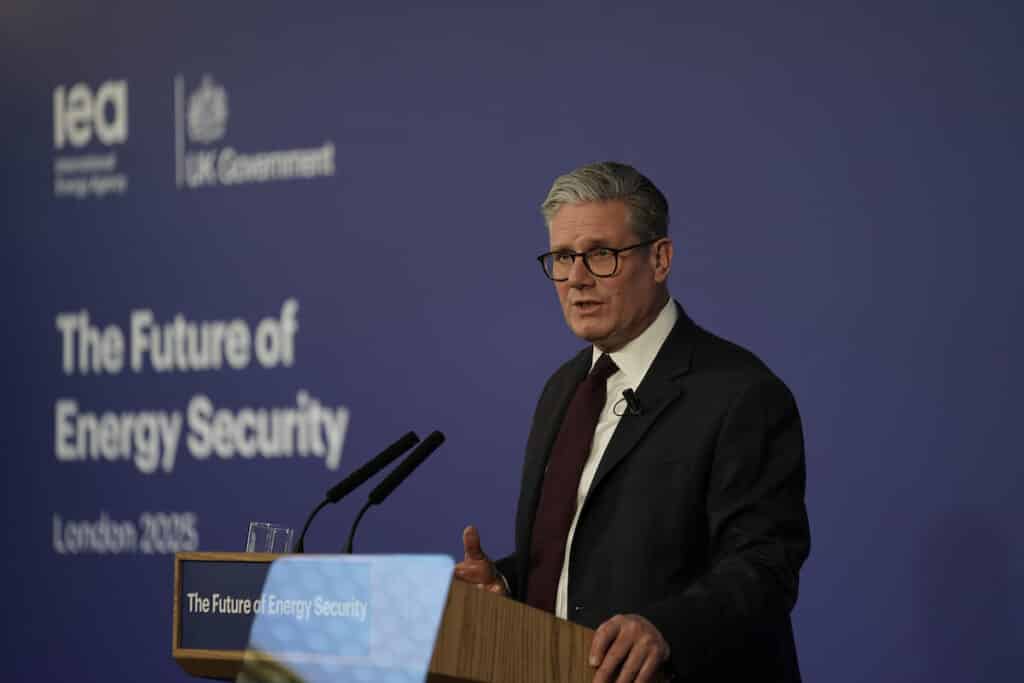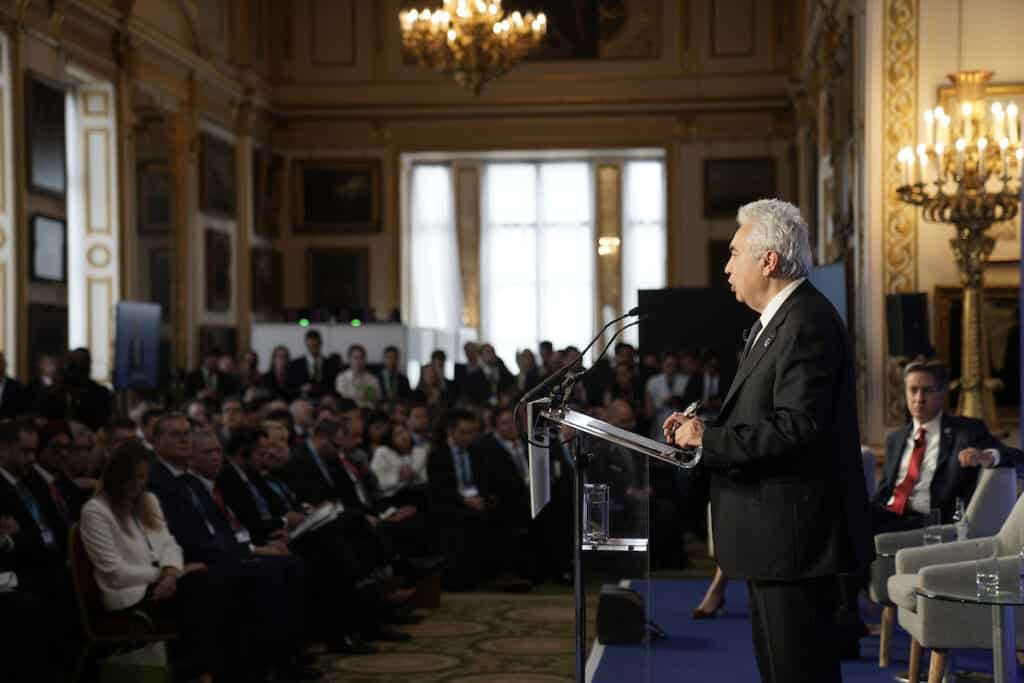IEA’s Future of Energy Security Summit Ends With a Call For Cooperation, Less Fossil Fuels and More Renewables
13 May 2025 – by Viktor Tachev
“In an unstable world, the only way to guarantee our energy security and protect against volatile energy price spikes is to speed up the transition away from fossil fuels to clean, homegrown energy. Together, we can mobilise international action for cheap, clean, secure energy as we drive forward the global energy transition,” said UK Energy Secretary Ed Miliband in the run-up to the Future on Energy Security Summit, jointly organised by the UK and the IEA on April 24 and 25.
The event’s leitmotif stressed the importance of increased global cooperation for reducing fossil fuel import reliance, scaling up renewables deployment and accelerating climate action to protect the most vulnerable. While over 60 governments, led by global superpowers like the UK, EU and China, agreed on a new energy security model based on renewables and cooperation, the US was once again the odd one out at the table. However, the country’s shift from a clean energy advocate under President Biden to a fossil fuel stronghold under current leadership opens up opportunities for Asian nations to take their place at the table of global negotiations.
IEA’s Future of Energy Security Summit Ends With a Strong International Drive For Collaboration on a Secure Energy Transition
The Future of Energy Security Summit, attended by energy ministers, major fossil fuel producers, renewable energy providers and representatives from civil society, saw high-level discussions on the geopolitical, technological and economic dimensions of global energy security.
The event ended with a strong signal that, despite ongoing geopolitical uncertainty, most countries consider a renewables-led transition and energy efficiency vital components of energy security. Parties united around the idea that energy security is national security, as declared by Keir Starmer, the UK prime minister.

The Chairs’ Summary emphasised the need to continue deploying clean technologies at unprecedented speeds and reducing reliance on fossil fuel imports to shield consumers from price volatility. Delegates also acknowledged that energy affordability concerns are growing even in advanced economies, where energy costs disproportionately affect low-income households. The Chairs’ Summary also aimed to instil a sense of realism, stressing that the world can’t phase out fossil fuels overnight and that they are likely to continue playing a role in the future, especially in industries lacking alternatives. However, it urged continued investment in emissions reductions across oil and gas supply chains, decommissioning ageing infrastructure and reskilling workforces. Delegates agreed that the energy transition should be fair and just, focusing on supporting regions and communities at risk of being left behind in the shift to new technologies and industries.
Aside from reducing reliance on fossil fuel imports, participants agreed that the future of energy security must also encompass other areas, including cybersecurity, extreme weather, supply chain resilience for critical minerals and clean technologies and the integration of electrified and decentralised systems.
The increasingly important role of electrification in economic sectors such as transport, heating and industry was another key point of discussion. Parties agreed on the need to secure power grids by designing systems that can accommodate flexible generation, storage, demand-side response and regional interconnection.
Most Countries Agree To Global Cooperation on Energy Security While Trump Administration Undermines Energy Transition Efforts
Throughout the forum, the EU and the UK expressed willingness to strengthen their energy transition cooperation and support national and global energy security. Key mechanisms on that front would be the UK-led Global Clean Power Alliance and the EU’s Global Energy Transition Forum. More progress is likely later this month during the UK-EU summit.
Importantly, delegates reaffirmed the vital role of the IEA in strengthening international cooperation and energy transition dialogue for scaling up low-carbon solutions at a time when the Trump administration discredited the agency and its push for clean energy.
While most participants at the forum got behind the idea that energy security requires shifting away from fossil fuel dependence and prioritising renewables, one delegation opposed it. The US emerged as the most vocal supporter of fossil fuels — a continuation of the climate change denialism policy of the new administration and a U-turn from the policies of former President Biden. The Guardian reports that the US representatives even declared the goal of reaching net zero by 2050 was “harmful and dangerous”.
On the contrary, China, which didn’t attend the event, expressed its determination to protect developing countries and establish itself as a climate leader on the world stage, vowing not to slow down its climate actions.
What It Means in the Context of Asia
In the lead-up to the forum, over 130 businesses and business associations urged governments to prioritise renewables, efficiency, storage and grid infrastructure in national energy plans. The group stated that these solutions deliver benefits far beyond emissions reductions, describing them as “the bedrock of a secure, competitive and affordable future”. It finds that 97% of business executives across 15 countries support a rapid transition to renewable power. Furthermore, the group estimates renewables have helped save over USD 409 billion since 2000 and created three times more jobs per dollar than fossil fuels.
During the event, the International Energy Forum Secretary General highlighted that “oil and gas must now account for the uncertainties in market design and demand outlooks introduced by the rising share of renewables in the energy mix”. Alternatively, ensuring energy security requires oil and gas to play a limited, supporting role rather than being the main pillar of the energy transition.

These points are crucial for South and Southeast Asian governments, which are shaping up as the largest growth markets for LNG over the next two decades, according to the IEEFA. Global Energy Monitor warns that completing the current LNG import capacity expansion plans in Southeast Asia would require a capital investment of over USD 220 billion and lock nations into relying on an economically volatile and insecure fuel.
Vietnam, the Philippines, Indonesia, Malaysia and Thailand are driving this push, with over 100 GW of power capacity and 47 mtpa of LNG import capacity in development. Often, these plans are influenced by the Japanese fossil fuel lobby, which builds gas markets in Asia to boost LNG trading and export fossil fuel-based technologies.
At the same time, Global Energy Monitor estimates that Southeast Asia’s planned solar and wind capacity could meet over half of the additional power needed by 2030, with the current LCOE of solar PV and onshore wind already cost-competitive with new gas power plants. Furthermore, prioritising renewables will reduce Southeast Asian nations’ dependence on LNG imports, paving the way for more secure and resilient energy systems.
“Fossil fuels have failed to deliver energy security — fossil fuel producers and even importers are vulnerable to price shocks,” said Farooq Ullah, senior policy advisor and lead of energy and climate governance in IISD’s energy program. “The clean energy transition is the best way to shield customers from these threats, and governments should invest public money accordingly.”
Energy Security and National Security as the Two Sides of One Coin: Climate Change Threatens Both
“Whatever national pathways, we share the fundamental belief that shared challenges require shared solutions,” said Miliband during the forum. And the climate crisis embodies these words best.
During the plenary and breakout discussions at the Future of Energy Security Summit, experts highlighted the importance of climate impacts as threats to national security. This is especially important for South and Southeast Asia, which are among the most climate-vulnerable regions in the world. According to Germanwatch’s Global Climate Risk Index 2025, four of the top 10 most affected countries by climate change between 1993 and 2022 were in Asia.
When market experts, economics and scientific evidence point toward the importance of limiting the role of LNG to a complementary one to renewables, any decision to ignore them would be a clear admission that energy security, cost efficiency and climate change aren’t a priority for Asian nations.
“The reality is that our current dependence on oil and gas is the single greatest weakness we have in this world dominated by bullies,” said Thomas Pellerin-Carlin, member of the European Parliament, during the event on account of the EU’s dependence on gas imports. For Southeast Asia, these words ring just as true.
by Viktor Tachev
Viktor has years of experience in financial markets and energy finance, working as a marketing consultant and content creator for leading institutions, NGOs, and tech startups. He is a regular contributor to knowledge hubs and magazines, tackling the latest trends in sustainability and green energy.
Read more






